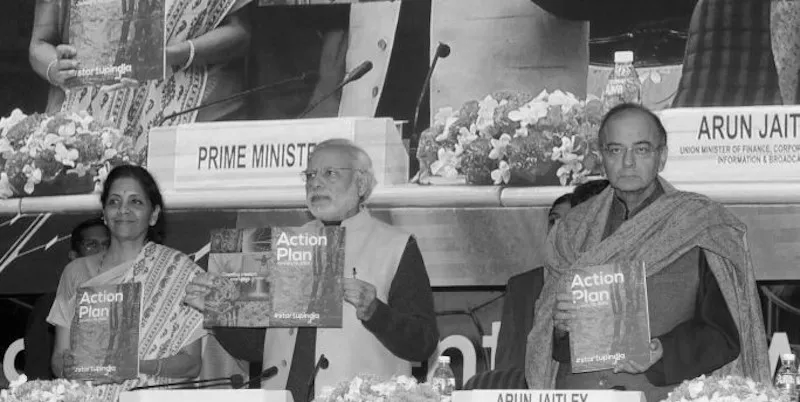The year set the stage for new tech and policy developments that augur well for startups
The year 2017 put the spotlight on startups like never before. From governments to corporates, everyone was looking at startups with new eyes. Sanjay Anandaram, a startup insider who has mentored entrepreneurs over the years, recaptures some positive developments that he says will only strengthen the startup ecosystem in the years to come.

It is that time of the year again when lists are made, stock taken of the year about to go by (2017!) and lessons for the future are tabled.
The startup world too isn’t immune to this effect, what with all the attention the world has garnered and will continue to garner in the years to come.
In my view, this year saw some unique developments that augur very well for the country. Rather than look at the data around funds, funding, and companies, it is interesting to consider these developments as manifestations of underlying developments.
- The Government of Karnataka in September became the first state to announce an Electric Vehicle policy. This even as the Central Government is working on an EV manufacturing policy, private companies are working on charging stations, batteries, and storage and startups are launching electric vehicles for a variety of use cases. In addition, centres of excellence in data sciences, Machine Learning (ML) and Internet of Things (IoT) were launched by the Karnataka government. These were launched in partnerships with different industry groups with committed participation from companies across the board. Training programmes were also launched. Other states are in the final stages of launching their own policies. The Central Government announced a draft drone policy in November – a healthy sign of states competing to create environmentally friendly industries and technology-enabled jobs of the future.

- Two technology startup acquisitions – Halli Labs (July) and Cmpute.io (Dec) - were announced by Google and Cisco respectively. These were young companies building technology in AI and management of cloud resources and were acquired for their technology vision, capability, and road-map, not for customers or revenues.
- India witnessed its first technology product IPO in Tejas Networks in June. Tejas (founded in 2000) designs, builds, and sells equipment to telecom service providers, defence, and governments in over 60 countries. The company’s financial and stock market performance has been very heartening. This is undoubtedly a major milestone in India for an Indian company.
- NITI Aayog’s 'Champions of Change' initiative in August, for the first time, reached out to entrepreneurs to create an institutionalised approach to innovative job creation in various sectors. That entrepreneurs would be called for their inputs – and not just big business – was a welcome effort.
- The growth of digital payments especially UPI based has been a first! 105 million transactions worth $1.5 billion occurred in November (up from 0.1 million in October 2016). Startups like Mobikwik, PhonePe, PayTM, WhatsApp, and Google’s Tez are on UPI. The adoption of a sovereign payments standard by all players in a non-mandated environment is an incredible development. The increasing acceptance of India Stack-based opportunities in 2017 is very positive for India. New modes of lending, plugging leakages in social benefit programmes, formalisation of the economy via GST, creating virtuous cycles in healthcare, education, and skills are enormously transformative for the Indian economy. Morgan Stanley in September forecast these generating a $6 trillion economy by 2027.

- The Indian e-commerce market has become a two-horse race with Flipkart and Amazon. More importantly, Softbank and Alibaba have emerged as major players in the entire retail ecosystem. The Indian e-commerce space has in effect become a proxy battleground for the Americans-Chinese-Japanese.
- Chinese investors in Indian startups and funds came of age. Alibaba, Tencent, Fosun, Shunwei, ZDream, Cybercarrier, and many others have invested upwards of $1 billion. The Japanese and Koreans too have emerged as players in the Indian startup ecosystem. A big change from the time when only Western firms saw India as an attractive opportunity.
- Indian startups are solving problems for India, in India. Logistics, cold-chains, renewables, healthcare, agri-tech are the areas of operation for innovative startups. The GST regime will make more of India accessible to startups by way of simplifying taxes and logistics. Technology platforms like YouTube have resulted in the coming-of-age of a slate of Indian entertainment oriented startups for Indians. The copy-cat wannabe startup that looked overseas for inspiration is on a rapid decline.
- Indian investors – PSUs, family offices, corporations – are slowly but surely investing in VC funds and in startups. This can only be good news as more and more local sources of capital become accessible to local entrepreneurs chasing local opportunities.

- There has been a sense of emotional and business maturity of startups all-around. Entrepreneurs and investors have realised that the function of a startup is to build a great business that creates value for all. The slowing of funding, the due-diligence, the focus on business milestones and so on are great for ensuring disciplined and focussed execution.
The above shortlist isn’t intended to suggest that there are no problems or challenges. There are still a significant number of issues that need serious consideration and resolution – bureaucracy, taxation, exits, to name a few.
(Disclaimer: The views and opinions expressed in this article are those of the author and do not necessarily reflect the views of YourStory.)







